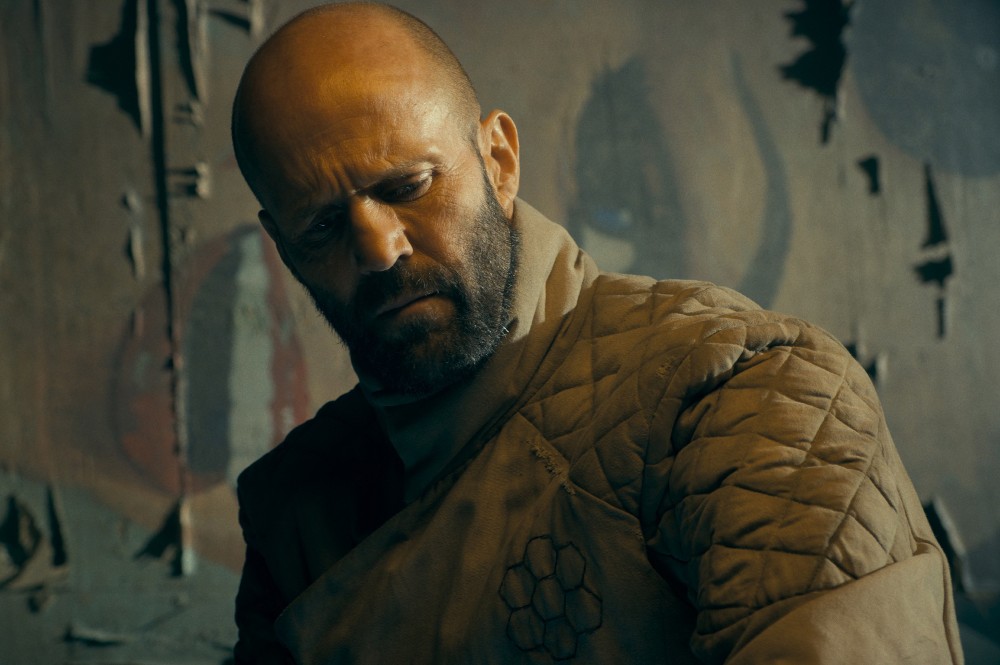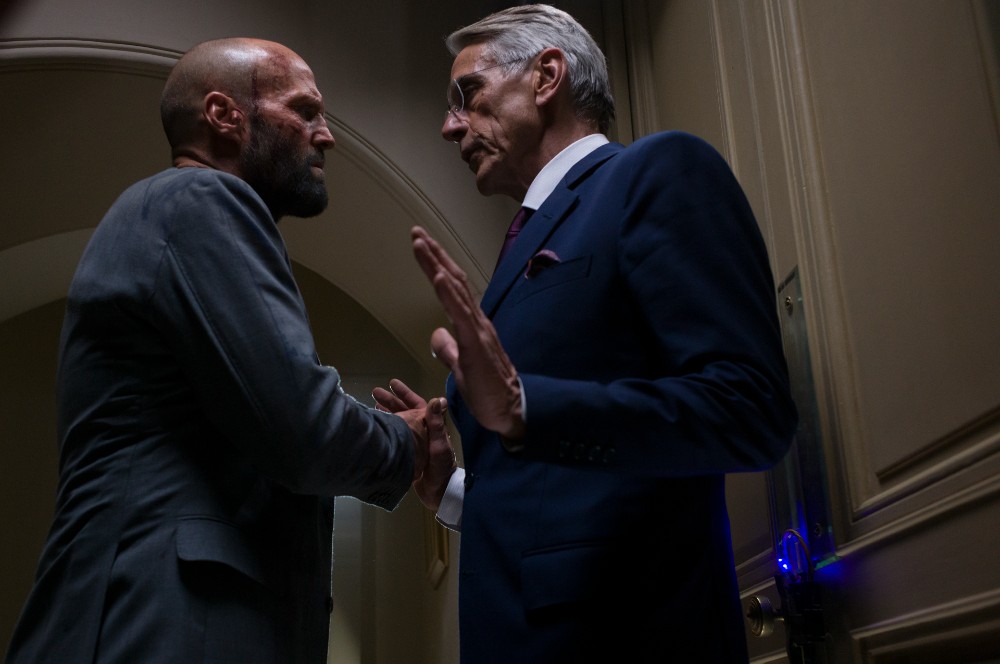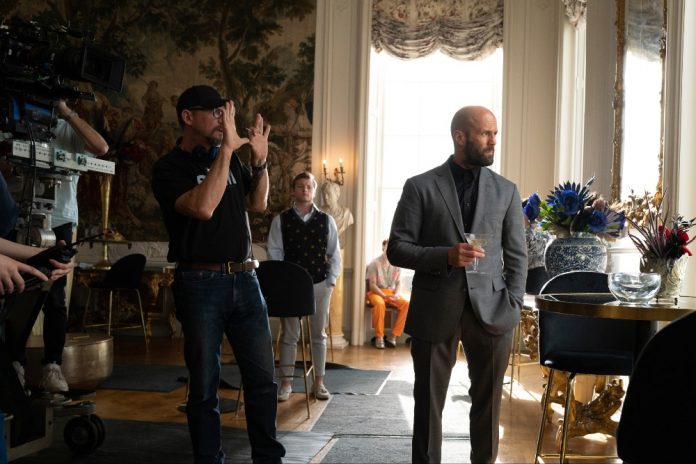In the 12 years plus that filmmaker David Ayer has been working in Hollywood, he’s probably seen and done it all. From his early days writing hits like the original The Fast and the Furious and Denzel Washington‘s Training Day, through his own career as a director with hits like Street Kings, and the WWII movie, Fury with Brad Pitt, Ayer has mostly followed a path of gritty realism. More recent projects like Suicide Squad and Bright, both with Will Smith, have strayed from that path a bit, but he always seems to be coming back to action.
His new movie, The Beekeeper, teams Ayer with the one and only Jason Statham as Adam Clay, a man living a quiet life caring for his beehives when his best friend (Phylicia Rashad) dies after being robbed of all her savings. The people responsible for robbing the elderly woman don’t realize that Adam is part of a secret agency known as “The Beekeepers,” and that he has military and tactical training that leads him on a mission of vengeance against those responsible.
Above the Line spoke with Ayer in person at the movie’s New York City junket where we spoke about working with Statham on The Beekeeper but also got a few updates on other projects, including his next movie, ANOTHER movie with Statham.
Above the Line: It’s been a long time since I’ve seen you, probably on the set of Suicide Squad I think was the last time, but you’ve kept pretty busy since then.
David Ayer: I try to keep busy, between the pandemics and everything.
ATL: How did this come together? There are three main factors — you Jason and Kurt Wimmer, the writer. Did Kurt write this and then everyone else came on board?
Ayer: Jason was already packaged in. He had been developing it with Kurt. The script came my way, I read it, said “yes.” I wanted to work with Jason, but also, it felt like it could be an instant classic, because it had those old school elements of the action movies I grew up on, that made me want to be a filmmaker, but also, felt very fresh and relevant.
ATL: Were any of you thinking of this as being Jason’s John Wick, something that maybe he could turn into more movies?
Ayer: I mean, definitely the potential for a John Wick-style franchise or an Equalizer kind of franchise. There’s some great world building involved. I think there’s a lot more about the beekeepers to learn, and I think… we’re set up for the sequel. We’re gonna do it. It was too much fun, and then people are really responding positively to it. And then, just is a director, it was new for me to work in a strange genre picture like this, a more popular style picture than a gritty drama, so I learned I really like it.
ATL: We’ve spoken many times over the years and maybe when we spoke for End of Watch or Sabotage, you mentioned that you knew many people in law enforcement and the military, so is it strange working on a movie that’s a little more stylish, and I guess more enhanced than your other work?
Ayer: A little more pop, more kind of shiny and fun.
ATL: Definitely more fictional, less grounded in reality, so what got you interested in doing something more like that?
Ayer: I mean, the challenge of it. Again, I haven’t done this before, and I’ll be honest, I was kind of terrified going in, because I didn’t know if I could pull it off. It was painting with a new palette, and just even the colorfulness, the photography, a brighter poppier, romantic world. And then finding that balance between some grounded bits and grounded performance and characters and a little bit of reality, and then some very heightened things happening, too. It was a huge learning curve for me, but now I definitely trust myself more in that space.

ATL: Does Jason have his own stunt team, or people he’s worked with on some of his other movies that he brings along?
Ayer: He’s pretty open to working with everybody. I know he’s worked with Jeremy Marinas before, and we brought Jeremy in, who is absolutely brilliant. I mean, he’s just a savant when it comes to understanding human kinetics and how it looks on camera. So between him – and he also directed second unit – and then Jason’s over-the-top, encyclopedic knowledge of action. “Oh, that bit was in this movie 20 years ago. That was done in 1910.” It was really challenging to come up with a new action grammar in a world where the audience is so sophisticated on action now.
ATL: It’s becoming quite common in these action movies for the star not to have many lines. And Jason doesn’t say very much, which is part of the charm of Adam Clay, because when he say something, it’s important.
Ayer: He’s such an everyman, and he obviously plays very stoic, and so when he does say something, it’s important. For me, as a director, directorially, how do I capture that line? How do I really sell that moment of… I really enjoyed working with him. I mean, he is a classic movie star, and there’s a handful now.
ATL: Did either of you study bee and how to keep them? My brother is actually a beekeeper, and I actually took him to the press screening of Harsh Times back in the day, which he loved. I’m not sure he’d be happy about what happens to the hives, though.
Ayer: There’s a dark bee moment there, which is kind of sad. It’s wild, because you start researching the history of beekeeping, and it goes right into mythology. It goes right into history. It goes right into the most basic core of the human construction. Bees enable agriculture, beekeepers enable civilization by keeping bees, and all the hive metaphors. Even things like Napoleon would wear golden bees on his uniform. It’s always a motif that throughout history, and you can almost imagine the beekeepers is this hidden hand, this hidden force, that does guide and protect us. There’s something very resonant about the mythology.
ATL: Did you actually shoot in Boston or is that the illusion of moviemaking where you just made it seem that way.
Ayer: It’s movie magic. We shot in London, and then did a couple days in Boston to pick up the atmospherics and establishers, but yeah, it was London for Boston. A credit to the location scouts.
ATL: That’s pretty amazing, because if you had any kind of street scene, you’d have cars driving on the wrong side of the road. I didn’t notice if there was any of that stuff.
Ayer: Yeah, the big red bus. Naw, we tend to kind of work around all that.
ATL: I’m not sure I realized you used David Sardy a lot to do your music, because I worked with him decades ago in my studio days with his band Barkmarket. What got you started using him for your scores ? What does he bring to the table there?
Ayer: I mean, he’s a huge producer, so he knows how to put music together. And then he has a lot of non-traditional ideas. I don’t know if you know anything about his office or his setup, but he has the most amazing synthesizer collection probably on the planet, vacuum tube stuff. He’s able to just create sounds that I think nobody else can.
ATL: Was this made with Miramax independently, or was MGM involved from the beginning? How did this come together with the studio?
Ayer: It was made with Miramax, and MGM Amazon came in very early, and they’ve just been like amazing partners. They got it, and they get it, and they saw the potential in this, and they’re absolutely knocking it out, selling the movie and getting it out there in theaters.
ATL: I’ve always known you from over the years as a writer, but you’ve directing more scripts written by others. Was that a conscious personal shift, or do you still write scripts but also try to keep directing when you find projects you like?
Ayer: It’s a hard game. It’s hard to find that crazy Venn Diagram of what works for the business, you can package it, you can sell it, it’s a commercial story. When something comes along, and there’s an opportunity to direct, and I know I can make a great movie out of it, I’m not gonna say “no.”

ATL: Is anything going on with doing more with Bright? Or did Will Smith’s thing sideline that a bit?
Ayer: Nah, nah. That got paused a few years back.
ATL: Do you still have interest in doing more in that world?
Ayer: No, there’s another director on it, so yeah, I’m not going back.
ATL: When I knew we were going to talk, I looked at IMDB, which I know can be the worst thing to do, since nothing’s ever right on there, but there are a couple things on there about you possibly developing a few remakes, writing those scripts. Is anything going on with those?
Ayer: I mean, there’s Dirty Dozen, which we’ve kind of been kicking around for a while. And it’s tough, because it’s such an iconic classic, and then, how do you satisfy the question of, “Why now? Why remake it now? And why is it going to be a worthy event?” That’s something we’re playing with, but it’s like anything, you just have a lot of irons in the fire.
ATL: Whenever I talk to you, you always have something else in development to do next.
Ayer: I’m dying to do another World War II movie. I really want to do a World War II movie again, and have a very specific idea about it. But I’m waiting to mature as a director and a writer, so I can actually pull it off, because it’s so important to me. I want to be able to meet it at the level I see it. I’m actually heading out to the UK to work on this movie called Levon’s Trade with Jason, based on the Chuck Dixon book series. He’s a big Marvel guy, wrote on Punisher, and things like that.
ATL: Of course. So you and Jason have found some kind of rapport that’s going to keep you working together for a bit?
Ayer: Look, life is really short, and it’s a hard business. So when you find someone that you’re happy to see when you go in to work in the morning, it’s something you want to hold on to.
The Beekeeper opens nationwide on Friday, Jan. 12, with previews on Thursday night.



